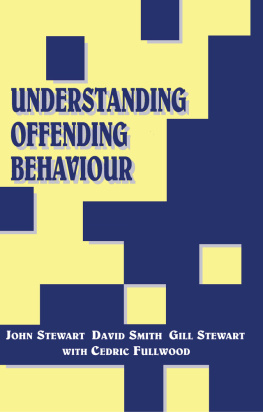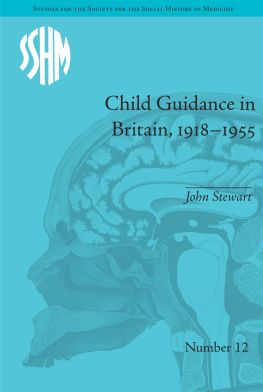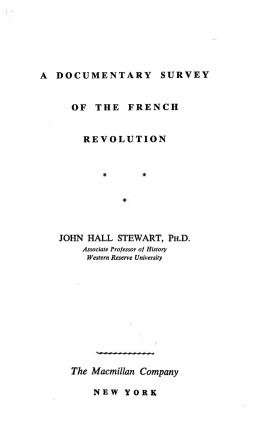Understanding Offending Behaviour
Other titles from Longman include:
NSPCC: Child Sexual Abuse: Listening, Hearing and Validating the Experience of Children by Corinne Wattam, John Hughes and Harry Blagg
NSPCC: Listening to Children: The Professional Response to Hearing the Abused Child edited by Anne Bannister, Kevin Barrett and Eileen Shearer
NSPCC: From Hearing to Healing: Working with the Aftermath of Child Sexual Abuse edited by Anne Bannister
NSPCC: Making a Case in Child Protection by Corinne Wattam
NSPCC: Key Issues in Child Protection for Health Visitors and Nurses edited by Christopher Cloke and Jane Naish
NSPCC: Children Speak: Children, Trauma and Social Work by Ian Butler and Howard Williamson
NSPCC: Participation and Empowerment in Child Protection edited by Christopher Cloke and Murray Davis
Making Sense of the Children Act (2nd edition) by Nick Ailen
Female Sexual Abuse of Children: The Ultimate Taboo edited by Michele Elliott
Looking After Young People in the Care System by Pat Goodall, Tony Laughland, Simon Biggs and Fergus Smith
Getting Started with NVQ: Tackling the Integrated Care Awards by Barry Meteyard
Young People and Drugs: A Multi-Disciplinary Training Manual by Mike Carr and Rosie Higgins
Answers: A Handbook for Residential and Foster Carers Looking After Young People Aged 11-13 Years by Ann Wheal and Ann Buchanan
Management and Delivery of Social Care by Max Taylor and Christine Vigars
Diversion from Custody for Menially Disordered Offenders by Catherine Staite, Neill Martin, Michael Bingham and Rannoch Daly
Child Care Law for Practitioners in Social Work, Health and Education edited by Nick Allen
Competence in Youth Work for Part-Time Youth Workers by Mark Price and Rosemary Napper
Competence in Youth Work for Managers and Trainers by Mark Price and Rosemary Napper
Social Services Training Manuals
First Line Management: Staff by Kevin Ford and Sarah Hargreaves
Effective Use of Teambuildine by Alan Dearling
Manual on Elder Abuse by Chris Phillipson and Simon Biggs
Developing Training Skills by Tim Pickles and Howie Armstrong
Training for Mental Health by Thurstine Basset and Elaine Burrel
Monitoring and Evaluation in the Social Services by David and Suzanne Thorpe
Quest for Equality by Errol John and Barbara Deering
Care Sector Quality: A Training Manual Incorporating BS5750 by Steve Casson and Clive George
Understanding Offending Behaviour
by
John Stewart,
David Smith
and
Gill Stewart
with
Cedric Fullwood
First published 1994 by Longman Group Limited
Published 2017 by Routledge
2 Park Square, Milton Park, Abingdon, Oxon OX14 4RN
711 Third Avenue, New York, NY 10017, USA
Routledge is an imprint of the Taylor & Francis Group, an informa business
Copyright Taylor & Francis 1994
All rights reserved. No part of this book may be reprinted or reproduced or utilised in any form or by any electronic, mechanical, or other means, now known or hereafter invented, including photocopying and recording, or in any information storage or retrieval system, without permission in writing from the publishers.
Notice:
Product or corporate names may be trademarks or registered trademarks, and are used only for identification and explanation without intent to infringe.
A catalogue record for this book is available from The British Library
ISBN 13: 978-0-582-23432-1 (pbk)
Typeset by The Midlands Book Typesetting Company, Loughborough
To the Probation Officers of Britain
The authors wish to thank the Social Policy (Steering) Group of the Association of Chief Officers of Probation, which was responsible for initiating and guiding the survey on which this book is based. The first chair of the Group was John King (CPO East Sussex, now retired) who provided invaluable encouragement, enthusiasm and support in the early days of the project. He was followed by Roger Statham, CPO Cleveland, who steered our research project to a satisfactory conclusion. The membership of the Group changed over the years, but we recall with particular affection for their unstinting support and advice: Sheila Leathley, Debts and Benefit Adviser, West Yorkshire PS; Stephen Stanley, Intelligence Officer, Inner London PS; David Stephenson, Senior Probation Officer, West Midlands PS and NAPO representative.
We wish to thank Cedric Fullwood (CPO Greater Manchester Probation Service) for his kindness in agreeing to contribute a chapter to this book.
Our small research team of Dr Moira Peelo, Ann Prior and our secretary Kate Hewer ensured that the survey construction, administration, processing and analysis were undertaken to the highest academic standards.
Out 'in the field' there are seven people whom we shall remember for their hard work, thoroughness, patience and skill in administering the questionnaires and conducting or organising the interviewing: Helen Davies (West Midlands PS); Marc Ghosh (Durham); Una Mulrenan (Nottinghamshire); Alan Peggie (Northumbria); Shirley Phillips (Avon); Dr Philip Whitehead (Cleveland); John Wilkinson (Inner London).
We do not know their names and so cannot acknowledge each personally, but around the country hundreds of probation officers took the time to complete our questionnaires thoughtfully. It is an inadequate mark of our appreciation for that work, but we thank them most warmly and, with the rest of their colleagues in the probation service, dedicate this book to them.
Gill Stewart, John Stewart
David Smith
Lancaster, June 1994.
- ABH actual bodily harm
- ACOP Association of Chief Officers of Probation
- CHE community home with education (residential child care)
- CPO chief probation officer
- community service order
- DSS Department of Social Security
- ET employment training
- ILPS Inner London Probation Service
- MPSO money payment supervision order
- NACRO National Association for the Care and Resettlement of Offenders
- NAPO National Association of Probation Officers
- PS probation service
- pw per week
- RTA road traffic act (offences)
- SIR social inquiry report
- TWOC taking (a vehicle) without the owner's consent (hence twocer, twoc'ing etc.)
- WRVS Women's Royal Voluntary Service
- YOI young offender institution
- YTS YT youth training scheme
As probation officers try to make sense of the experience of those with whom they work, they constantly stress its sheer complexity, and the impossibility of identifying a single clear cause of crime. This book will, therefore, be discouraging to those in search of simple answers to the questions of what causes crime and what should be done about it.
The bulk of the book consists of the presentation and analysis of data on the offending behaviour of young offenders in contact with the English probation service in January 1991. It offers a typology of offending based on the accounts given by the probation officers involved, of how they understood the problems of these young people and what they had tried or would try to do about them. From these accounts there emerges a vivid sense of the difficulties many young offenders face in managing their lives, and the difficulties probation officers face in trying to help them. The background is often one of poverty (with little hope of relief), disrupted and unhappy early experience, substance dependency and stressed relationships, within a local environment which offers plentiful opportunities and even encouragement for criminal involvement. A recurring theme is the way in which economic pressures and problems of social and personal adjustment interact to produce the circumstances in which offending becomes a possible, even a likely, outcome. The typology of offending behaviour is an attempt, necessarily an untidy one, to impose an intelligible structure on a mass of data which has the rawness and immediacy of front line practice with society's most troubled and troublesome young people.








